
A recent New York Times investigation of 75 think tanks revealed many scholars and researchers affiliated with these organizations often took on other positions, including roles as corporate board members, lobbyists and outside consultants. No federal law or even the norms of ethics dictate this as wrong or illegal, but the Times found that disclosures related to such work is often scant, if noted at all.
The results should put readers on notice. When a scholar at a well-known think tank or university is presented as a subject-matter expert on a range of issues, from climate change to human rights, a quick background check is needed to ensure these experts are not expressing their views with strings attached.
We are quickly impressed by someone who has a Ph.D., who is a “fellow” at a think tank, or is a distinguished professor at a top university. And we should be: Accumulating the research to write those dissertations can take years, evident in the abundant number of ABDs (“all but dissertations”) who either ran out of money or patience or started a family and decided to enter the workplace.
More than dedication is needed to accumulate all that knowledge, so these experts are certainly entitled to cash in, either with money or in the media. And the hard work does not stop once academics become faculty members or researchers. As a result, they should enjoy the fruits of their labor, as when business school professors are hired as consultants by top companies or political-science experts appear on major news networks to discuss this year’s election.
Nevertheless, these same experts should publicly disclose their affiliations and the payments they received from these organizations.
Greenpeace, for example, has investigated the work of academics who are affiliated with companies and trade groups that attack climate change science. One Penn State professor, who also testified in hearings led by Texas Sen. Ted Cruz, insisted his work was completely independent before Greenpeace researchers revealed he had received payments from the coal company Peabody Energy.
Academics and scholars for hire are nothing new. During the mid-1990s, Princeton University was accused of serving as a front for the Turkish government, which endowed a new chair of Turkish Studies staffed by a former lobbyist for the country. Armenian-Americans accused the professor, Heath Lowry, of spending his career denying the Armenian Genocide and working as cover for Turkey’s dubious human rights record.
In more recent years, some accused companies of hiring academics in an attempt to defeat, and then water down, the Dodd-Frank financial sector reforms legislation in Congress. When Republicans took control of the House in 2011, they eliminated a rule requiring experts to disclose private-sector ties before they testified, the Nation reported in 2013. Such lack of disclosure effectively allows selective testimony to be delivered at Congressional hearings.
To be fair, this ongoing scholars-for-hire scheme benefits those on the right and left alike. The Times’ investigation showcased the work of Dr. Mark McClellan, a former Food and Drug Administration commissioner. McClellan, who until January was a fellow at the Brookings Institution, also served as a board member of Johnson & Johnson. At hearings last November, he defended Johnson & Johnson’s high-priced drug treatments for hepatitis C. Last month, Brookings rewrote its conflict of interest policy in a move to bolster disclosure and reduce perceived bias.
Carol Browner, EPA administrator under Bill Clinton, was a paid consultant to the nuclear energy industry while she was a fellow advocating action on climate change for the American Center for Progress. As is the case with many of her peers, Browner was an unpaid fellow – but such affiliation with these organizations has certainly allowed academics to cash in by offering their services as consultants to corporations and industry trade groups.
Academics have a role as arbiters on the endless stream of information needed to make important decisions. While it is ingrained in us to accept their research, it behooves these experts to disclose the organizations with whom they work.
Four years ago, when I was a guest of HP at a recycling tour, an executive touted the company’s study that insisted using paper to print was “greener” than going paperless. When I noted that of course a corporate-sponsored study would support HP’s stance, and asked why a neutral third party like a university did not undertake the study, the representative became flustered. Increasingly defensive, she blurted out, “No one would read a study!” Well, the fact is, they do, because we trust those who spend years researching and working within their chosen fields.
But the lesson here is that when quoting anything coming out of a university or think tank, a quick Google search could reveal more questions and answers. The time is now to demand from academics the same thing we want from corporations: transparency.
Image credit: Leon Kaye

Leon Kaye has written for 3p since 2010 and become executive editor in 2018. His previous work includes writing for the Guardian as well as other online and print publications. In addition, he's worked in sales executive roles within technology and financial research companies, as well as for a public relations firm, for which he consulted with one of the globe’s leading sustainability initiatives. Currently living in Central California, he’s traveled to 70-plus countries and has lived and worked in South Korea, the United Arab Emirates and Uruguay.
Leon’s an alum of Fresno State, the University of Maryland, Baltimore County and the University of Southern California's Marshall Business School. He enjoys traveling abroad as well as exploring California’s Central Coast and the Sierra Nevadas.














